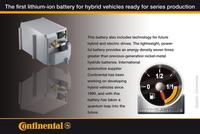Eco-Friendly Battery to Begin Series Production in 2009 in Mercedes Luxury Sedan
HANOVER - September 4, 2008: Continental has developed the first production-ready lithium-ion battery for hybrid vehicles. “This is the battery of the future,” announces Continental’s Chairman of the Executive Board, Dr. Karl-Thomas Neumann. Economical and eco-friendly vehicles are in increasing demand, and the driving forces behind this are global climate change, dwindling resources, and rising oil prices. This modern and powerful type of battery is setting new standards: this new technology from the international automotive supplier is a huge step forward, especially for hybrid vehicles, which use an electric motor to assist combustion engines. Hybrid drives need powerful batteries to drive electric motors and to store energy produced during braking.
“Powerful batteries make an electric motor more powerful — which in turn makes them more effective in relieving the combustion engine, and the passenger vehicle then drives leaner and cleaner,” says engineer Stefan Koller, head of the lithium-ion battery research group at the Institute for Chemical Technology of Materials at the Graz University of Technology. In nearly every regard, the new lithium-ion batteries are far superior to the nickel-metal hydride batteries that have been used in the past because they are more compact, lighter, and have a longer service life. These batteries have already become the battery of choice in small appliances, cell phones, notebooks, and cordless screwdrivers. “This technological development is racing forward. I would say that in ten years, around 30 percent of all cars will be using this source of energy,” states Koller.
As early as 2009, Mercedes-Benz plans to equip the S 400 BlueHYBRID with the new Continental technology as standard.
When that happens, this Mercedes will be one of the most economic, fuel-efficient combustion-engine luxury sedans in the world. These batteries assist the electric motor, which kicks in during acceleration to add extra power. The combustion engine runs on its own at higher speeds, but shuts off automatically at traffic lights. This "mild hybrid" passenger vehicle uses only 7.9 liters of fuel per 100 kilometers—almost two liters less than similar vehicles equipped with a combustion engine only.
“Cars with two motors that run more efficiently in city driving alone or that just idle more efficiently during traffic jams are going to become increasingly sought after,” says Koller.
The reason is that in the future, the new generation of high-performance batteries is going to put cars on the road that run solely on electricity. “In the next few years, we will be producing lithium-ion energy storage batteries for mild and full-hybrid as well as electric vehicles,” Neumann explains.



